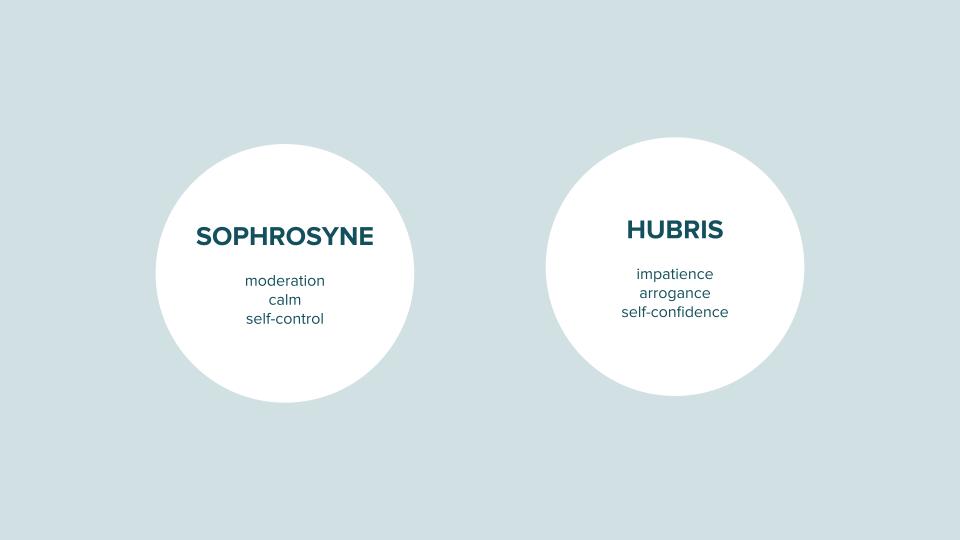From the doctrines of Confucianism to the cardinal virtues of Christianism, modern humanity has always sought to define the most desirable traits of mind and character. For the ancient Greeks, sophrosyne was an important concept describing a sound mind and an excellent character—a combination of moderation, self-control, and temperance. In today’s chaotic world, this ancient virtue can act as a guide to better manage our emotions.
“Sophrosyne is the greatest virtue, and wisdom is speaking and acting the truth, paying heed to the nature of things.” — Heraclitus.
Sophrosyne over hubris
Sophrosyne is an ancient word. So, first, let’s cover a bit of etymology. Sophrosyne comes from ancient Greek σωφροσύνη (sōphrosúnē, “soundness of mind, temperance, prudence”), based on σῶς (sôs, “safe, sound”) and φρήν (phrḗn, “mind”). In The Republic, Plato wrote: “Sophrosyne controls our penchant for concupiscence.”
Sophrosyne is often described in opposition to the concept of hubris. While sophrosyne is all about moderation, hubris refers to extreme pride, self-confidence, and arrogance. A hubristic person may display a loss of contact with reality and an overestimation of their own capabilities. The spiritual descent of Lucifer into Satan is perhaps one of the most famous examples of hubris.
Choosing sophrosyne over hubris is to choose temperance over impatience, self-control over self-confidence, calm over resentment. To the ancient Greeks, sophrosyne was a key pillar of society, a sign of what they called “moral sanity”. Theognis of Megara describes a world where, after Pandora opens a jar (often mistranslated as a box) containing many evils, sophrosyne and other important deities abandon humankind:
Hope is the only good god remaining among mankind;
The others have left and gone to Olympus.
Trust, a mighty god has gone, Sophrosyne has gone from men;
And the Graces, my friend, have abandoned the earth.
— Theognis of Megara (6th-century BCE)
The ancient Greeks were not the only ones to value sophrosyne. The term was still used in philosophy and religion for centuries afterwards. According to philosopher and Catholic priest St. Thomas Aquinas, sophrosyne is the fourth and final cardinal virtue, after prudence, justice, and fortitude.
More recently, classical philology researcher—and expert on Greek and Roman literature—Helen North described sophrosyne as the union of self-knowledge and self-restraint. To demonstrate this virtue, one needs to know themselves, and to use that knowledge to exercise control over their emotions and behaviour.
The art of mindful moderation
This may all sound like an ancient concept with little relevance to today’s world. But, as with many philosophical questions, the Greeks did spend a lot of time thinking about how best to live one’s life. The key principles of sophrosyne are simple enough to be implemented even in today’s chaotic world.
Want to apply some of that ancient Greek wisdom to feel more in control of your emotions? Here are three simple ways to practice sophrosyne in your daily life:
- Practice mindful moderation. Temperance and self-restraint are key components of sophrosyne. Do you really need to buy this product? Do you really want to eat that extra piece of cake? Without going all the way to extreme minimalism, sophrosyne can lead to a more mindful approach to the way we consume—whether it’s a new shiny toy or some sugar-laced food. Just take a minute to really think about your decisions. Better yet, give yourself an arbitrary amount of time before you act on them. For instance: “I will buy this product on Sunday if I still want it” or “I will eat that extra piece of cake after I finish writing this document.” It will give time for your mind to still, and will help you think more clearly.
- Cultivate calm amidst chaos. Life can get pretty chaotic. When we let our emotions overrule our mind, we become stressed and anxious. As a result, we may not make the best decisions. There are many strategies you can apply when things become too hectic to think properly. And the good news is: most of them are completely free. Journaling, meditation, breathwork, and calmly discussing a situation with a trusted friend are all great ways to practice sophrosyne by consciously cultivating calm amidst chaos.
- Exercise your self-control. You may not always be able to keep your cool when things don’t go the way you expected. However, trying to catch yourself when you lose control of your emotions to gently regulate your impulse is a great way to practice sophrosyne. Over the long term, self-control builds up self-governance, the ability to make decisions based on your own authority rather than factors outside of your control. Who wouldn’t want that?
As philosopher Demophilus allegedly said: “The vigor of the soul is sophrosyne, the light of a soul free of disturbing passions.” Sophrosyne is an ancient practice which is still relevant in today’s world. Even in the most chaotic of environments, it can help develop a more mindful, calm, and controlled approach to life.

